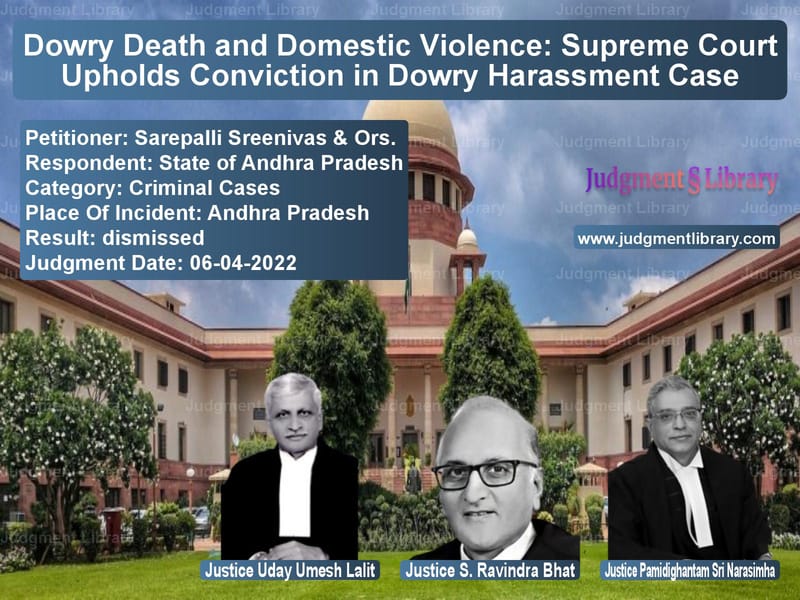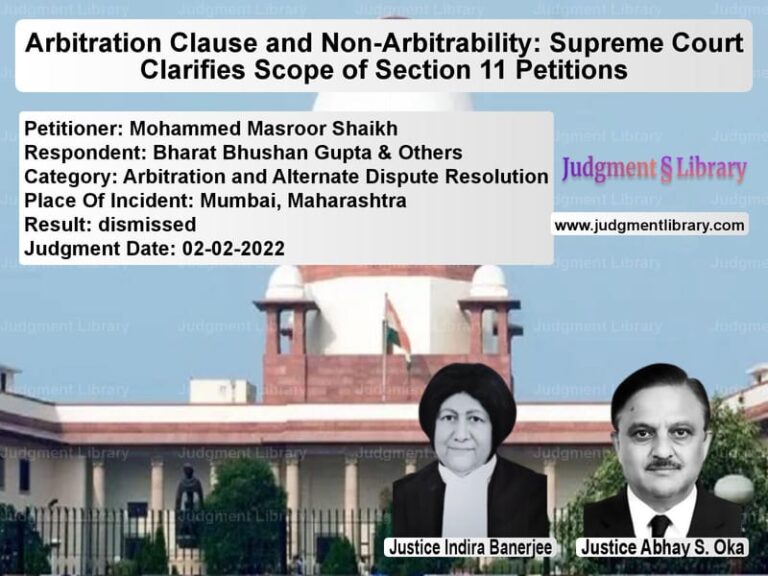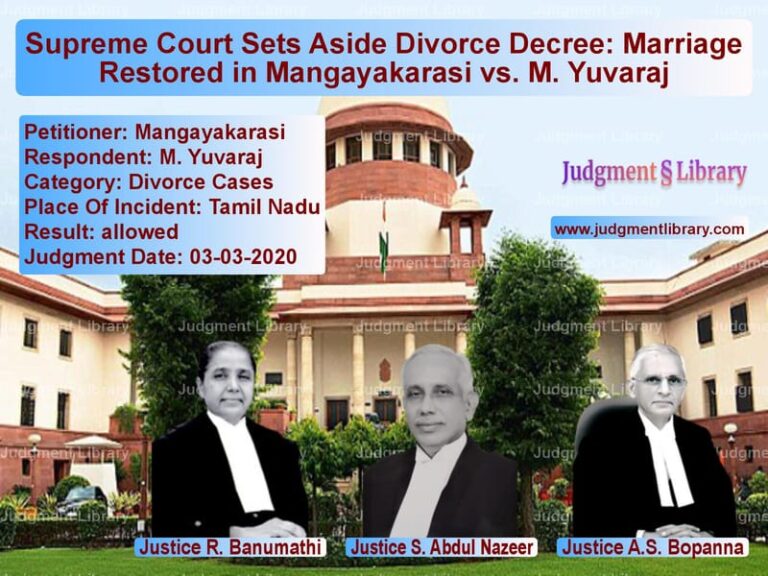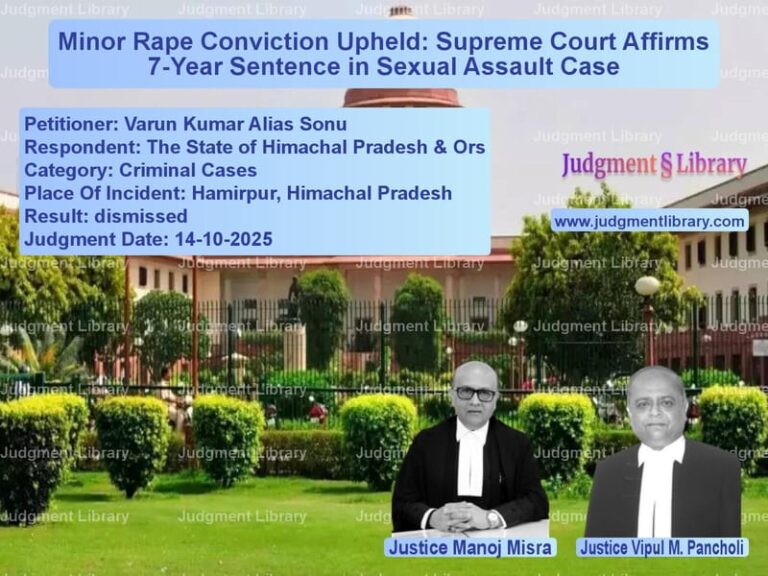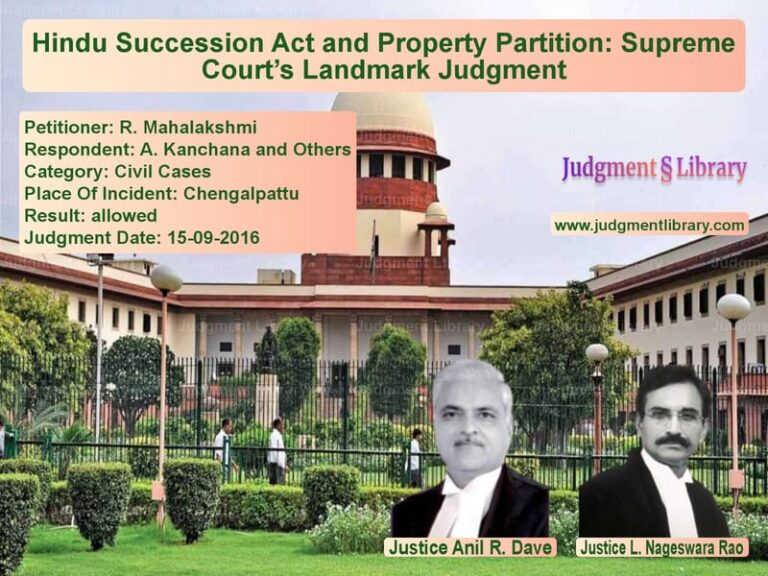Dowry Death and Domestic Violence: Supreme Court Upholds Conviction in Dowry Harassment Case
In a landmark judgment, the Supreme Court of India upheld the conviction of the accused in a dowry death case, highlighting the ongoing crisis of domestic violence and dowry harassment in the country. The case, Sarepalli Sreenivas & Ors. v. State of Andhra Pradesh, revolves around the tragic death of Sridevi, a young woman who was subjected to relentless cruelty and harassment for dowry. The court meticulously examined the evidence, including medical reports, witness testimonies, and circumstantial evidence, to conclude that the accused were responsible for her unnatural death.
Background of the Case
Sridevi was married to the prime accused, Sarepalli Sreenivas, in May 2005. As per traditional dowry practices, her family provided Rs.2,00,000 in cash, jewelry, and other valuable items at the time of marriage. However, soon after the marriage, the in-laws and husband started pressuring her for more dowry, including a share in her parental home, ‘Sridevi Nilayam.’
The prosecution established that Sridevi was repeatedly harassed and tortured for failing to meet the financial demands of her in-laws. The situation escalated until her tragic death, which the accused initially attempted to pass off as a suicide by burning.
Legal Issues Before the Court
- Was the victim’s death a case of suicide, accidental burning, or a premeditated murder?
- Did the prosecution provide sufficient evidence to establish that the accused were responsible for dowry harassment?
- Were the legal provisions under Section 304B (dowry death) and 498A (cruelty by husband and in-laws) of the Indian Penal Code (IPC) applicable?
- Did the lower courts err in convicting the accused?
Arguments by the Petitioners (Accused)
The defense, represented by senior counsel, put forth the following arguments:
- The death of Sridevi was an unfortunate accident and not a result of intentional harm.
- There was no direct evidence linking the accused to the alleged crime.
- The witnesses, primarily the victim’s family members, were biased and had an interest in implicating the accused.
- Accused no.4 and 5 (sisters-in-law) were living separately and had no role in the alleged cruelty or death of the victim.
Arguments by the Respondents (Prosecution)
The prosecution, led by the State of Andhra Pradesh, countered these arguments with strong evidence:
- Medical reports confirmed that Sridevi was strangled before being set on fire.
- Multiple witnesses, including the victim’s mother, brother, and a close neighbor, testified about the persistent dowry demands.
- The accused had a clear motive, as they sought additional financial gains through continuous pressure on the victim.
- The High Court had already examined and upheld the conviction based on substantial evidence.
Supreme Court’s Observations
After hearing both sides, the Supreme Court made the following critical observations:
1. Death Was Not an Accident
The Court found strong medical evidence indicating that Sridevi was first strangled and then burned to stage her death as a suicide. The bench noted:
“The evidence on record clearly shows that the deceased was done to death by strangulation and thereafter an attempt was made to camouflage the death as one which arose out of burn injuries.”
2. Dowry Harassment Was Proven
The Court placed heavy reliance on the testimonies of the victim’s family and other independent witnesses. It observed:
“When harassment for dowry is persistent, and the death of the woman occurs under unnatural circumstances within the matrimonial home, the presumption under Section 304B IPC operates against the accused.”
3. Legal Principles Upheld
The Supreme Court upheld the High Court’s ruling, stating:
“When circumstantial evidence overwhelmingly points to the guilt of the accused, it is incumbent upon the court to uphold justice rather than allow technical arguments to subvert truth.”
4. Acquittal of Sisters-in-law
Considering the absence of direct evidence against accused no.4 and 5 (sisters-in-law), the Court granted them the benefit of the doubt and acquitted them.
Final Judgment
- The Supreme Court upheld the conviction of accused no.1 (husband) and accused no.2 (mother-in-law).
- The sentence awarded by the lower court was confirmed.
- Accused no.4 and 5 (sisters-in-law) were acquitted.
- Accused no.3 (father-in-law) had passed away during the trial, leading to the abatement of charges against him.
Implications of the Judgment
- Strengthening Women’s Rights: The judgment reinforces the legal protections available to victims of dowry harassment.
- Importance of Circumstantial Evidence: The ruling highlights that even in the absence of direct eyewitness accounts, a conviction can be secured based on strong circumstantial evidence.
- Need for Legal Awareness: The case underscores the need for families to be vigilant against dowry demands and take timely legal action.
Conclusion
The Supreme Court’s verdict in this case is a reminder that dowry-related crimes continue to plague Indian society. The judgment upholds the principle that justice must be served, especially in cases where vulnerable individuals suffer due to societal malpractices. The ruling also sends a clear message that perpetrators of dowry harassment and domestic violence will face strict legal consequences.
Petitioner Name: Sarepalli Sreenivas & Ors..Respondent Name: State of Andhra Pradesh.Judgment By: Justice Uday Umesh Lalit, Justice S. Ravindra Bhat, Justice Pamidighantam Sri Narasimha.Place Of Incident: Andhra Pradesh.Judgment Date: 06-04-2022.
Don’t miss out on the full details! Download the complete judgment in PDF format below and gain valuable insights instantly!
Download Judgment: sarepalli-sreenivas-vs-state-of-andhra-prad-supreme-court-of-india-judgment-dated-06-04-2022.pdf
Directly Download Judgment: Directly download this Judgment
See all petitions in Murder Cases
See all petitions in Dowry Cases
See all petitions in Domestic Violence
See all petitions in Bail and Anticipatory Bail
See all petitions in Custodial Deaths and Police Misconduct
See all petitions in Judgment by Uday Umesh Lalit
See all petitions in Judgment by S Ravindra Bhat
See all petitions in Judgment by P.S. Narasimha
See all petitions in dismissed
See all petitions in supreme court of India judgments April 2022
See all petitions in 2022 judgments
See all posts in Criminal Cases Category
See all allowed petitions in Criminal Cases Category
See all Dismissed petitions in Criminal Cases Category
See all partially allowed petitions in Criminal Cases Category

